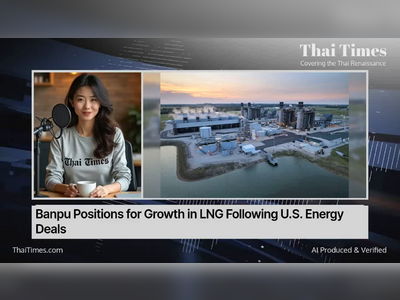Asian Markets Falter Amid Lack of Clarity from China
Investors remain cautious as China's economic plans disappoint, while anticipating key decisions from global central banks.
Asian equities experienced a notable decline yesterday, driven primarily by traders' disappointment over the lack of specifics from a major economic conference in China.
As uncertainty loomed, there was a generalized weakening of risk appetite across the region, compounded by the anticipation of next week's crucial US Federal Reserve interest rate meeting.
In Thailand, the SET index encapsulated this sentiment as it fluctuated between 1,429.68 and 1,456.92 points within the week, ultimately settling at 1,431.67—a 1.4% downturn from the previous week.
The daily trade turnover averaged 39.08 billion baht, highlighting active participation although not sufficient to lift the index.
Investor behavior across the region reflected a mix of strategies: retail investors emerged as net buyers with a 3.1 billion baht influx, closely followed by institutional investors' 2.4 billion baht.
Conversely, foreign investors withdrew 5.4 billion baht, with brokerage firms also being net sellers at 83.26 million.
In broader news, the European Central Bank recently enacted its fourth interest rate cut of 2024, reducing its deposit facility rate to 3% while also revising its inflation outlook.
President Christine Lagarde conveyed concerns over the eurozone's economic momentum, which appears to be waning as manufacturing slows and growth in the services sector diminishes.
Meanwhile, BlackRock, the globe’s largest fund manager, has floated a suggestion for investors equipped with adequate governance structures and risk tolerance to allocate up to 2% of their portfolios to bitcoin.
In the corporate arena, Elon Musk's net worth surged past $400 billion, largely bolstered by a remarkable 71% rise in Tesla’s stock this year and the climbing value of SpaceX.
The global airline industry anticipates a lucrative 2025, with projected net profits soaring to $36.6 billion, an increase driven by a forecasted all-time high of 5.2 billion passengers, according to the International Air Transport Association.
In the tech sector, China’s anti-monopoly regulator is examining Nvidia, a major US chip maker, for potential antitrust violations amid an escalating chip conflict between Washington and Beijing.
In the United States, consumer inflation met expectations with a climb to 2.7% annually in November, up from 2.6% the previous month.
The jobs report indicated a rise of 227,000 non-farm positions, with a stationary unemployment rate of 4.2%, paving the way for an anticipated Fed rate cut.
The Bank of Canada followed suit with monetary easing, reducing its key policy rate by 50 basis points to 3.25%, though it signaled a slower pace of future cuts.
Amid broader geopolitical dynamics, the Biden administration is considering stricter sanctions on Russia's lucrative oil trade.
China's foreign trade activities reflected subdued consumer demand with both exports and imports missing projections—imports dropped by 3.9%, marking the steepest decline since September 2023.
The Indonesian rupiah breached a critical threshold, surpassing 16,000 per dollar, prompting central bank intervention efforts to stabilize the currency.
In corporate movements, German online fashion retailer Zalando announced its plans to acquire competitor About You for 1.1 billion euros, strategizing a stronger footing against Chinese e-commerce firms.
On the domestic front, Thailand unveiled several economic stimulus measures aimed at revitalizing the slowing economy, including affordable loans for local businesses and reduced energy prices.
These developments come as multiple central bank meetings and economic reports are anticipated next week, including inflation updates from the UK and Eurozone, retail sales figures from the US, and trade statistics from Japan.
As uncertainty loomed, there was a generalized weakening of risk appetite across the region, compounded by the anticipation of next week's crucial US Federal Reserve interest rate meeting.
In Thailand, the SET index encapsulated this sentiment as it fluctuated between 1,429.68 and 1,456.92 points within the week, ultimately settling at 1,431.67—a 1.4% downturn from the previous week.
The daily trade turnover averaged 39.08 billion baht, highlighting active participation although not sufficient to lift the index.
Investor behavior across the region reflected a mix of strategies: retail investors emerged as net buyers with a 3.1 billion baht influx, closely followed by institutional investors' 2.4 billion baht.
Conversely, foreign investors withdrew 5.4 billion baht, with brokerage firms also being net sellers at 83.26 million.
In broader news, the European Central Bank recently enacted its fourth interest rate cut of 2024, reducing its deposit facility rate to 3% while also revising its inflation outlook.
President Christine Lagarde conveyed concerns over the eurozone's economic momentum, which appears to be waning as manufacturing slows and growth in the services sector diminishes.
Meanwhile, BlackRock, the globe’s largest fund manager, has floated a suggestion for investors equipped with adequate governance structures and risk tolerance to allocate up to 2% of their portfolios to bitcoin.
In the corporate arena, Elon Musk's net worth surged past $400 billion, largely bolstered by a remarkable 71% rise in Tesla’s stock this year and the climbing value of SpaceX.
The global airline industry anticipates a lucrative 2025, with projected net profits soaring to $36.6 billion, an increase driven by a forecasted all-time high of 5.2 billion passengers, according to the International Air Transport Association.
In the tech sector, China’s anti-monopoly regulator is examining Nvidia, a major US chip maker, for potential antitrust violations amid an escalating chip conflict between Washington and Beijing.
In the United States, consumer inflation met expectations with a climb to 2.7% annually in November, up from 2.6% the previous month.
The jobs report indicated a rise of 227,000 non-farm positions, with a stationary unemployment rate of 4.2%, paving the way for an anticipated Fed rate cut.
The Bank of Canada followed suit with monetary easing, reducing its key policy rate by 50 basis points to 3.25%, though it signaled a slower pace of future cuts.
Amid broader geopolitical dynamics, the Biden administration is considering stricter sanctions on Russia's lucrative oil trade.
China's foreign trade activities reflected subdued consumer demand with both exports and imports missing projections—imports dropped by 3.9%, marking the steepest decline since September 2023.
The Indonesian rupiah breached a critical threshold, surpassing 16,000 per dollar, prompting central bank intervention efforts to stabilize the currency.
In corporate movements, German online fashion retailer Zalando announced its plans to acquire competitor About You for 1.1 billion euros, strategizing a stronger footing against Chinese e-commerce firms.
On the domestic front, Thailand unveiled several economic stimulus measures aimed at revitalizing the slowing economy, including affordable loans for local businesses and reduced energy prices.
These developments come as multiple central bank meetings and economic reports are anticipated next week, including inflation updates from the UK and Eurozone, retail sales figures from the US, and trade statistics from Japan.











